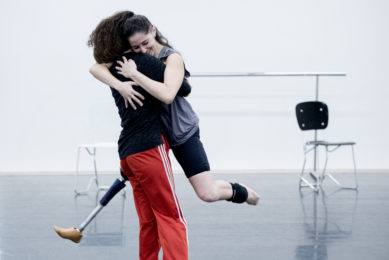“My parents gave me the freedom to choose what happens to my body.”

Originally from Brazil, Mickaella Dantas moved to Portugal in 2011 to work for Candoco Dance Company, before moving to London to join the company permanently in 2017.
At the start of the conversation, Mickaella explains that at the age of 11, she was diagnosed with cancer in her leg. She had two years of chemotherapy until eventually being given the option of amputation. During this time, she felt that the medical process she went through affected how she experienced disability.
“Spending two years in hospital, witnessing friends die, you become very grateful to have just lost a leg.”
When it came to the decision to amputate her leg, Mickaella explains “My parents gave me the freedom to choose what happens to my body.” This was incredibly important to Mickaella and looking back now she is grateful she was able to have the choice at such a young age. She feels this helped her in her process of acceptance because it was her decision to make and her parents supported her.
Growing up in a small town in Brazil, Mickaella felt everyone around her in her family and community embraced her as she became disabled and she now feels a huge connection with her hometown because of this.
Talking about her experience of disability in Brazil compared to the UK Mickaella says “The UK looks at disability very differently, even compared to other places in Europe.”
Having grown up in Brazil, Mickaella shares how poverty really frames most of society there, especially in terms of disability, gender, sexuality, or even access to water. Mickaella feels that there is a “we need to carry on” attitude, almost like a natural survival mode that everyone operates in.
She recalls a time, three months after she became disabled, when her mum had been helping her a lot but then said “I can’t help you anymore; if you want to live your life, you need to live your life.” Mickaella remembers this being a pivotal moment at which she learnt how to be independent in her new body.
Although Mickaella feels this attitude has helped her in terms of acceptance, strength and learning to navigate an inaccessible world, she acknowledges that Brazil has little if no disability support.
“Physical access is non-existent…it’s a mess” she explains. As a disabled person she didn’t feel very supported in terms of architectural accessibility.
Mickaella explains that, as someone who has moved here from a different country, her experiences of the UK and disability will vary to those who have grown up in the UK or to those who have other access requirements than she does.
Overall, since living in the UK she has felt a huge support from the NHS for prosthetics and for her general health. “I know I don’t require a lot of help but in relation to my disability I have felt very supported in the UK.”
“I can see in the UK that there are a lot more discussions about diversity and inclusion, but not just with regard to disability, also with regard to Black Lives Matter and other topics like sexuality and gender.”
As the conversation moves on to disability and dance Mickaella explains “I’m very Brazilian…The way I speak and think and my general attitude resonate a lot with my Brazilian side. When I am dancing or watching dance I tend to think ‘give me more, you can do it, more!’”
She goes on to explain that with her connection to Porto in particular she likes to stay up to date on disability culture there. Portugal has Acesso Cultura (Access Culture), an organisation that works to improve disabled culture and access inside and outside of theatres. “You can really see the change taking place in the arts.”
Another person that Mickaella speaks about is Henrique Amoedo, the creator of the Roda Viva Cia de Dança in Brazil and of Dançando com a Diferença in Portugal. “He’s a very very important person in terms of bringing the inclusive dance scene forward in Brazil and Portugal. Not just in the arts, but in the society and academia too.”
Sometimes Mickaella feels like it can seem like she doesn’t talk about her disability or that she forgets that she is disabled, but explains that it isn’t the case, she is disabled but she’s also a woman, a spiritual person, an artist and much more. She is proud to be a disabled woman, but remembers that she has many layers.
“When it comes to art and disability, I choose to firstly focus on the artistic subject, considering my whole identity inclusive of disability. I think about the quote “…art can melt walls” by Meredith Monk and feel it reflects my experience of being in a disabled body and being a dancer”


